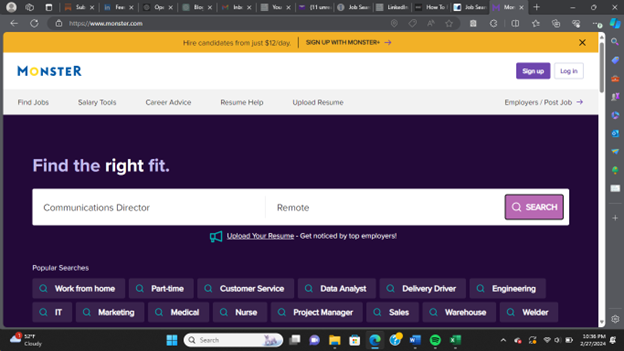How to Find Legitimate Remote Job Opportunities: 7 Strategies
Working remotely can be life changing.
If you remember life before the pandemic, if you were in the working world, you were most likely going to an office four to five days a week. There was little flexibility, little care for work-life balance in a wide range of industries.
Frankly, it sucked.
Post pandemic, the world has changed, and working remotely is in many cases encouraged. There are still a decent number of professionals that have to go into an office, more than they’d like to.
The good news is there’s tons of remote job opportunities out there, the bad news is, you have to be careful about the remote job you find. But first, let’s define what a remote job is…
What is a legitimate remote job?
Let’s make sure we’re clear on what is considered a “legitimate remote job” so we’re all on the same page. Here’s the definition:
“A legitimate remote job is a position where individuals can work from a non-office location, such as their home, for a reputable company. These jobs offer fair compensation, adhere to employment laws, and maintain professional standards throughout the hiring process and employment tenure.”
Now that we have a clear idea on what a legitimate remote job is, let’s see what would make a remote job not legitimate and one you should stay away from.
When are remote job postings considered scams?
· Vague job descriptions with unrealistic promises.
· Requests for upfront payment or personal financial information.
· Poorly designed or unprofessional job postings and our company websites.
· Lack of verifiable company information or online presence.
· Communication primarily through unprofessional email addresses or messaging platforms.
· Pressure to make quick decisions or sign contracts without thorough review.
· Job offers with unusually high salaries or benefits for minimal qualifications or experience.
· Requests to purchase expensive equipment or software before starting the job.
· Inconsistencies or discrepancies in the hiring process, such as unclear interview procedures or irregular communication.
· Lack of transparency regarding job duties, company policies, or contract terms.
Now that we know what a legitimate remote job is and the type of remote job scams to avoid, we can focus on finding the best ones out there.
One more word on scams though, while we’re on the topic (and we may talk more cams as we go so don’t hold me to only saying one more thing). Be very aware of the “Virtual Assistant” job postings. Some are real, but many are not.
I once had some claiming they were from ESPN reach out to me on LinkedIn asking if I was interested in a Remote Virtual Assistant role. As someone who wasn’t born yesterday, I had a gut feeling that ESPN didn’t have any Virtual Assistant jobs, but I checked just to be safe.
Shockingly (I should say unshockingly), ESPN had no job postings for a Virtual Assistant on their company website. The next day, the person’s LinkedIn profile completely disappeared, including their message to me.
I tell this story because there are scams everywhere and even if they sound good, you need to do your homework.
Since you’re now scam experts, let’s take a look at some remote job search tips to help you improve your current work situation.
How to find legitimate remote jobs
Strategy 1; Utilize Online Job Boards:
The first and easiest strategy is to make sure you have a profile on all of the big job boards:
Example of How to Search For A Remote Job on Indeed:
1. Ener “Remote” or “Virtual” in the Location Section:
2. You can put “Remote” or “Virtual” in front of the job title:
Example of how to search for a job on Muse.com
1. Search for “Remote + Job Title” i.e. Remote Communications Director
2. Once you hit enter, on the next screen, search for Communications Director in the title section and then “Remote” in the location
Examples of how to search for jobs on Monster.com:
1. Search for the job title in the Job Title section and enter Remote in the location section.
2. Add Remote in front of the Job Title you’re looking for and then put your physical location in the “location” sectio
A Friendly Word of Warning:
Unfortunately, not all jobs on these sites are legitimate. A vast majority are, but there are scams lurking everywhere. If you panic, just go back to the section where we talk about how to figure out if a job posting is legit or not.
Strategy 2: Company Websites:
One of the safest ways to find remote jobs that you can trust is by going directly to the company’s website. This requires you to make a list of the companies you want to work for, but assuming you’ve done that work, you can skip the job boards and go right to the source.
If you need help doing the work to be able to use the strategy of the company website search, here’s an article that can help.
Here’s how to search for a job on a company page.
1. Go to the Company’s Home Page and scroll to the bottom
2. Click on the “Careers” section, add the job title you’re looking for a then put “Remote” or “Virtual” in the location section.
A friendly word of warning:
Depending on the company, you may find that their job postings page is out dated. If this is the case, you may want to try and reach out directly to an employee through the site if possible.
In today’s world, Recruiters and HR professionals sometimes may not have the time to keep the site up to date. So just be careful when you apply and look at the dates the jobs were posted.
Strategy 3: Use LinkedIn:
LinkedIn is a great place to look for all types of jobs, especially remote jobs. You’ll be able to use some of the techniques you read about when searching for legitimate remote jobs on the job boards, but there’s also one thing that separates LinkedIn from everywhere else.
You can make connections and network.
Not only can you research jobs and apply for jobs, but you can also reach out to the professionals posting the jobs to find out if they’re legit or not. Here’s a couple quick ways you can determine if the job you see on LinkedIn is a scam or legitimate:
1. Look to see where the company is based. If it’s unclear whether or not there’s at least a physical headquarters in some city, you may want to re-think the job you’re applying to.
2. You can’t view the job poster’s profile. I’ve had cases where the person who’s posting the job on LinkedIn doesn’t have a profile you can view, or it’s bear with just the minimum information filled out.
3. No experience is required. There are situations where you can find jobs that require little to no experience that are legit, but in most cases, if the posting has NO EXPERIENCE REQUIRED multiple times throughout the post, something might be fishy.
Besides the occasional scams you might find, LinkedIn is a great place to go to search for remote jobs. If you need to learn some strategies on how to search for jobs on LinkedIn, click here.
Strategy 4: Attend Remote Job Fairs:
Job fairs way to do this is by attending Virtual Job Fairs.
These job fairs ironically, may even be in-person, which would be even more helpful since you’d really be able to get a feel for the job talking to someone in person.
Job fairs, whether in person or remote, are great for you to get a chance to ask as many questions as you want about the company, the employees, the work, etc., before you apply and have an interview.
Here’s how to find a remote job fair:
1. If you are in the New York area, go to the Department of Labor NY website
2. Once on the website, you can find resources for virtual job fairs and links t
Strategy 5: Check Freelancing Platforms:
Another strategy for finding legitimate remote jobs is to use freelancing websites. Upwork and Fiver are the two most popular, but there are tons of other sites out there where you can start working as a Freelancer.
The good thing about these sites is that it let’s you dip your toe into the industry you’re looking to get into and do some client work as you’re learning your skill. You get to decide which jobs are right for you so if they don’t feel right, you don’t have to bid on the jobs.
If you want to learn how to get your first job on Upwork, check out the below video.
If you want to try your hand at Fiver, watch this video.
A friendly word of warning:
You should know that there are a few drawbacks to these sites:
- The pay can be really low for client work.
- Clients can be difficult.
- If you are brand new to the industry, it may be difficult for you to get work.
Strategy 6: Remote Work Agencies:
Job agencies can be ext6remely helpful in helping a job seeker find all types of jobs, including remote work opportunities. They can take the pain of the job search off of your shoulders and put it on their team.
There are different agencies for different industries, so make sure you decide what field you want to look for a job in before contacting an agency.
An agency we can recommend is Russell Tobin & Associates as they have a great reputation for helping their clients and have years of experience in a number of different industries.
Strategy 7: Use Social Media:
Social media can be an important tool when it comes to finding a legitimate remote job. You know how important LinkedIn is, but don’t forget about the other platforms too.
You should understand the industry you’re looking to work in and know what platform would be best to connect with professionals in that industry.
A friendly word of warning:
Make sure your social media pages are up to snuff before you start reaching out to other people trying to connect about potential opportunities. You don’t want to come off as unprofessional on your profiles, so you should make sure those are cleaned up first.
What to do next:
Now that you’ve taken note of all these strategies to use to find a legitimate remote job, try the two or three you feel most comfortable with and put them into action.
Remember, finding remote jobs isn’t too much different than finding regular jobs, but with all the scams on the internet, you’ll want to take the extra time to make sure you’re getting into the right situation.
If you need some guidance along the way, the coaches here at Your Career Strategy would love to help. You can book a 45 min call to get some help now for no charge. Just tell them you read this article and you’ll be on your way to success.
We’d also love to hear from you! Tell us how your experience was finding a remote job.










